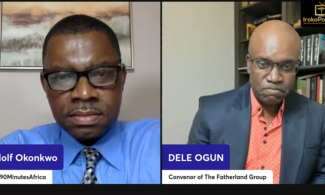
The convener of the Fatherland Group made the statement on Sunday during an exclusive interview with Rudolf Okonkwo of 90MinutesAfrica.
UK–based Nigeria lawyer Dr. Dele Ogun has disclosed that the major culprit in the scrapping of regional government in Nigeria was Gen. Yakubu Gowon (retd.) and not Gen. Aguiyi Ironsi as it is popularly believed.
The convener of the Fatherland Group made the statement on Sunday during an exclusive interview with Rudolf Okonkwo of 90MinutesAfrica.
"It's completely misplaced to say Aguiyi Ironsi's decree 34 was what abolished the regional system in Nigeria because military rule is by definition unitary," Ogun stated. "So the unitary system came in as a result of the coup."
The author of the book "A Fatherless People" explained that Decree 34 was simply used as an excuse to perpetuate the 1966 pogrom against the Igbo people.
He insisted that the decree promulgated by Yakubu Gowon, creating 12 states in 1967, formally abolished the regions and replaced them with states.
The prolific author, however, express the belief that it is unwise for anyone to advocate for a return to the regional system of government, which he described as the "Berlin strategy," which allows one ethnic group to be joined to another whose culture and language they don't share.
He argued that to get it right, Nigerians must retrace their steps to the structures that existed before the artificial amalgamation of the various ethnic groups into Nigeria.
"The structure is natural because the territories are there, and everybody knows the area of their ethnic groups," he said. "We should allow self-governance on that basis rather than using the Berlin strategy to cut those ethnic groups and join one piece with another group somewhere else whose culture they don't share."
He acknowledged that there may be a need to support the ethnic building blocks of the new nation in the transition period to ensure smooth development.
"Obviously, there would have to be some support networks, at least during a transitional period. And this is why there will still be the union to offer support in the transitional period,” Ogun explained.
"As the resources are not evenly distributed among the various ethnic groups, so too is the weight of responsibilities they can carry. So, a network of mutual support is required in the early stages to enable the new units to develop to a point where they can function independently.”
He argued that the borders of the current system were artificially drawn, as was done in the Berlin Conference, and that building the nation based on the ethnic units, which he called the Orange Union, would resolve many of the internal contradictions challenging Nigeria today.